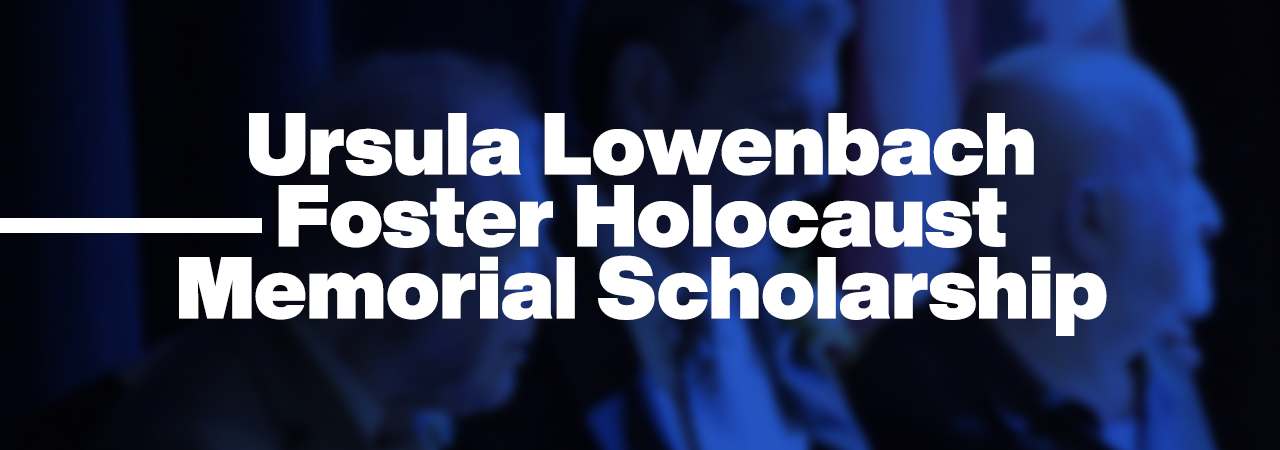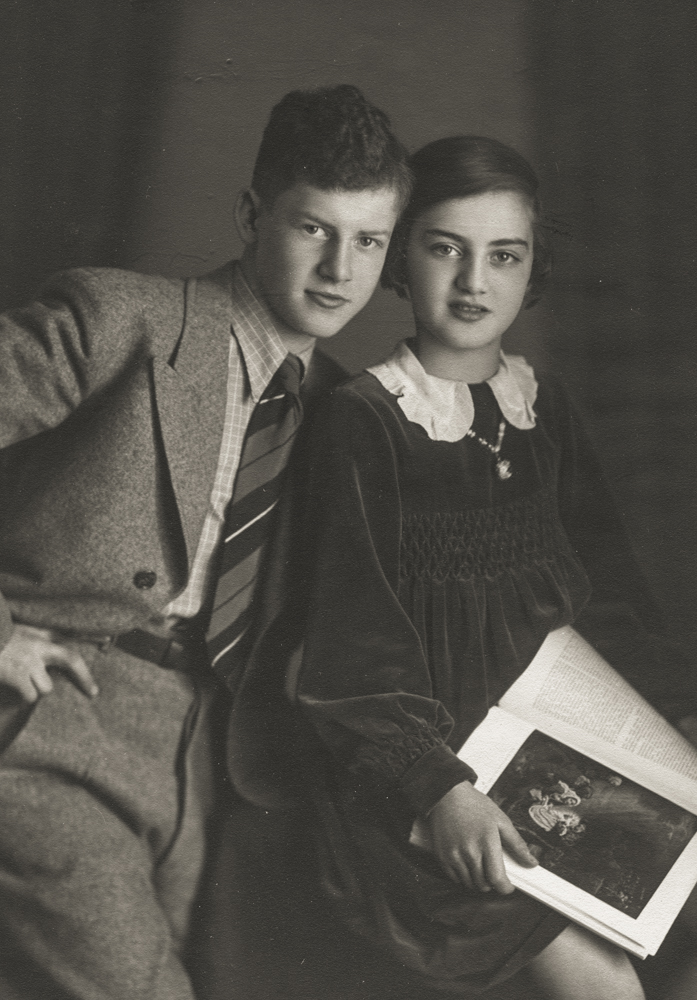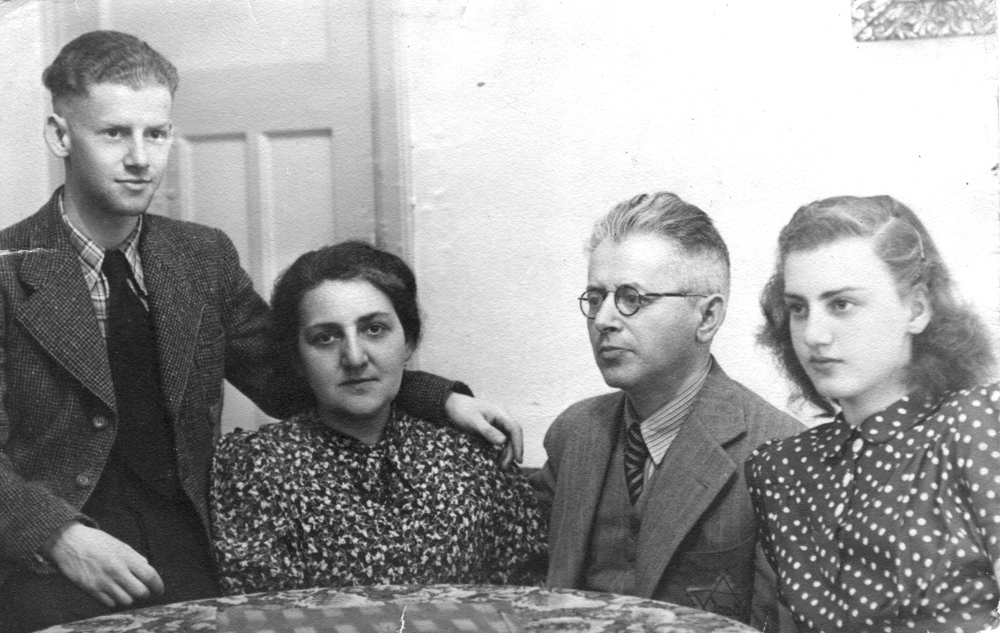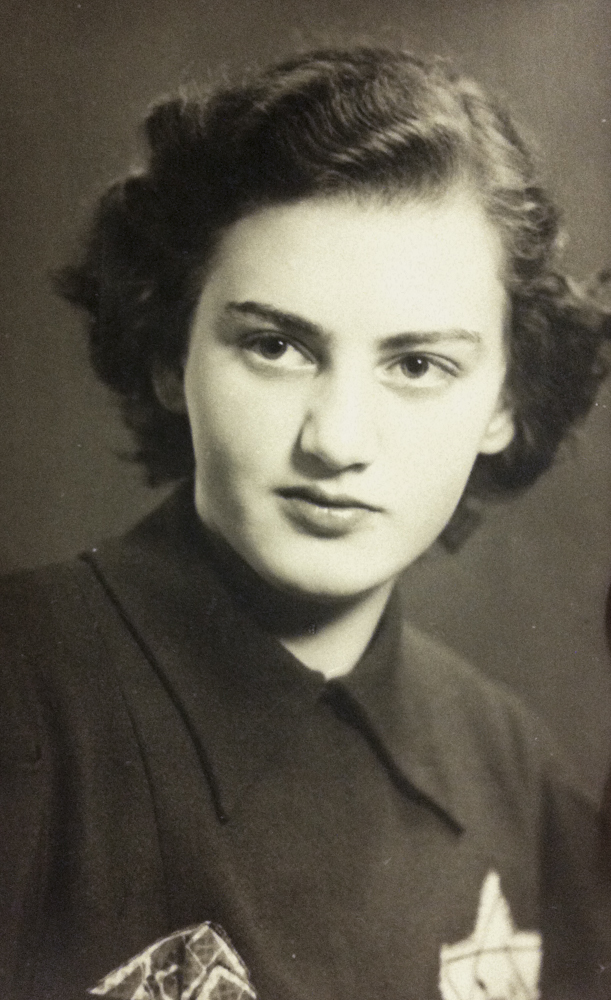
Ursula Lowenbach Foster Holocaust Memorial Scholarship
Ursula Lowenbach (at that time) with Yellow Star.
“Life is not made of years….Life is made of moments. It is the moment, that illuminates or darkens your life. The sum of the moments is the sum of one’s life.”
About Ursula Lowenbach
Ursula Lowenbach Foster impacted the lives of the many students she shared her story with, and her journey to make a difference continues today in a legacy that will live on forever. In our mother’s honor, my brother and I have established the Ursula Foster Holocaust Memorial Scholarship, in order to inspire students to learn more about discrimination and adversity, so that through the voices of our children, the world will never forget.
Ursula Lowenbach Foster, a Holocaust survivor and former classmate of Anne Frank, fled Germany, and moved to Amsterdam in 1938 when she was 11, to escape Nazi persecution. Two years later, Germany conquered the Netherlands, and brought the same persecution to Ursula’s new home. In 1942, that persecution took a dramatic turn for the worse when Ursula’s older brother, Ernst, at age 18, was sent by the Nazis to Auschwitz Concentration Camp in Poland, where he was murdered in the gas chambers.
In order to avoid a similar fate, Ursula and her parents went into hiding in 1943. For nearly two years, they lived secretly in an overcrowded house with 14 other Jews, all hidden by a merciful Dutch family. For one of those years, all 16 of the guests were forced to sleep in the dirt underneath the house — among the crawling insects and rats — in order to escape detection by the Nazis. It was a devastating, humiliating manner of existence, the horrors of which few of us could ever truly grasp. And though it would have been much easier to let the memories of those days fade forever, Ursula spent many years before her passing courageously doing just the opposite.
As a way to honor her brother Ernst, and for the betterment of the world, Ursula did her best to keep the memory of the Holocaust alive, so that such a terrible thing would not happen again. Although very shy, she gave her time and shared her experiences to many school children at schools in Modesto, giving talks about the Holocaust and its horrific impact on her life and those of her family and friends. She wanted children to know how precious freedom is, and that we can’t take it for granted. We must learn from the past, she said, about “what can happen if prejudice and hatred are allowed to run wild.”
—Clifford Lester, Professor Emeritus, Cypress College

Ursula Lowenbach Foster Holocaust Memorial Scholarship
About
History is the result of choices made by people at a particular time. The Holocaust occurred because individuals, groups, and nations made choices to act or not to act.
Ursula Lowenbach Foster survived the Holocaust because of the choice made by a courageous Dutch couple. They secretly hid Ursula, her parents, and 13 other Jews in an overcrowded house in Amsterdam. After barely escaping detection by the Nazis and spending a year sleeping in the dirt underneath the house among the crawling insects and rats, Ursula and the 15 other Jews were liberated by the Allies in 1945.
Later in life, Ursula displayed her own courage by overcoming her shy nature to share her terrifying experiences with innumerous children at many different schools.
Ursula had a tremendous impact on the lives of those students, teaching them what can happen “if prejudice and hatred are allowed to run wild.” This scholarship is a testimony to the legacy Ursula created.

Awards
A $1000 scholarship will be presented to the top entry in each of the following categories:
College Division
Essay/Poetry Category
Visual/Performing Arts Category
High School Division
Essay/Poetry Category
Visual/Performing Arts Category
Scholarship Presentation Format Options
Written Prose
May include essays or poetry.
Visual & Performing Arts
May include original music, photography, dance, computer-generated images, ceramics, charcoal, pencil, pastel, watercolors, acrylics, or oils.
DEADLINE FOR SUBMISSION: APRIL 14, 2025
Eligibility
To be eligible for the scholarship, submit an entry following the instructions contained in this document. All entries will be reviewed by the Scholarship committee and prizes of $1000 will be awarded to the top finisher in each college and high school category.
Requirements
Step One: Research or interview a Holocaust survivor, witness, or rescuer.
Step Two: Based on what you have learned from your research in Step One, choose a topic for your submission from one of the following themes:
- WE MUST NEVER FORGET — The U.S. Holocaust Memorial Museum in Washington has Elie Wiesel’s famous words carved in stone at the entrance. “For the dead and the living, we must bear witness.” With the passing of time, fewer survivors remain alive to tell their stories. Consider a means to preserve and pass on the stories of Holocaust survivors so that the persecution of all groups can be avoided in the future.
- SAVE ONE LIFE AND YOU HAVE SAVED THE WHOLE WORLD — Many people are familiar with the story of Oscar Schindler and his role in saving the lives of Jewish people during the Holocaust. Research the life of another individual who helped save Jewish people. What motivated them to risk their life to save Jews during the Holocaust? How can we help others find this level of courage for the betterment of today’s world?
- THAT WHICH DOESN’T KILL ME MAKES ME STRONGER — Despite the tortured past of Holocaust survivors, many of those who survived the Holocaust have found ways to move past those horrors and succeed in many fields. Research or interview a survivor who faced persecution yet persevered, and who later contributed to society in a positive way. Express the impact the survivor’s story has on your life.
- THOSE WHO FORGET THE PAST ARE DOOMED TO REPEAT IT — The Holocaust was not the first mass persecution of Jewish people. To make sure there is never again a mass persecution of any group of people, governments and individuals must be ready to take action. Based on lessons learned from the stories of Holocaust survivors, provide your specific recommendations about actions that should be taken.
Step Three: Choose to submit your presentation in one of the presentation formats indicated below. Only one entry per person.
Written Prose – May include Essays or Poetry. Essays must be between 500 to 750 words, original poems 750 words or less. Please indicate word count on submission.
Visual & Performing Arts – May include original music, photography, dance, computer-generated images, ceramics, charcoal, pencil, pastel, watercolors, acrylics, or oil.
Submission Criteria
- Scholarships open to students of any faith.
- Only currently enrolled Cypress College students are eligible to apply.
- Entry forms, essays, poems, music and dance submissions, must be submitted as digital files.
- Visual arts entries should be submitted as original art.
- Film/Dance/Music: Final file size must not exceed 600 MB.
- Large files may be submitted using WeTransfer.com, a free file transfer website.
- All entries must be original work. Any entry deemed to be an edited version or rendering of someone else’s work will be disqualified.
- Deadline for Submission is April 14, 2025.
Submissions will be evaluated based on the following criteria
Submission:
- Demonstrates evidence of insight and personal reflection.
- Communicates clearly the inspiration and intent of the piece in the artist’s statement.
- Approaches selected topic thoughtfully.
- Reflects artistry, skill, and originality and in the case of a written entry, demonstrates cohesiveness, good grammar, and syntax.
- Is memorable and engaging, purposeful, and historically accurate.
Please Submit Completed Electronic Package To
Cypress College Foundation
foundation@cypresscollege.edu

